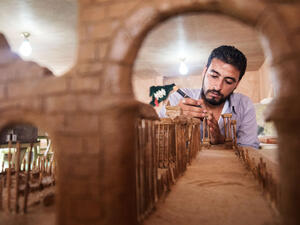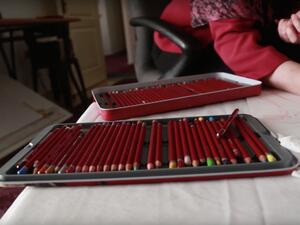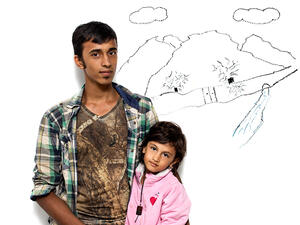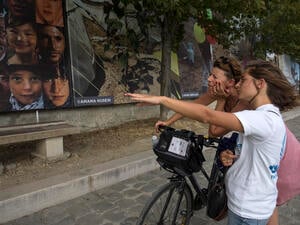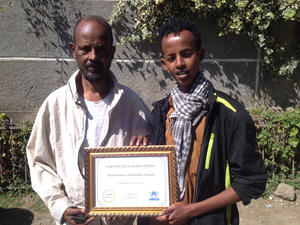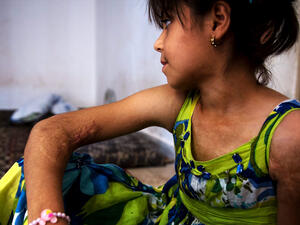"No paint, no gain" for Afghan artist in Ukraine
"No paint, no gain" for Afghan artist in Ukraine

Akbar Khurasani became a Ukrainian citizen after 17 years in the country.
KYIV, Ukraine, Jan 22 (UNHCR) - Afghan artist Akbar Khurasani, a former refugee now naturalised in Ukraine, has donated to UNHCR a work drawn on his own experience, in appreciation of the refugee agency's assistance over the years.
The painting, titled "Refugees", is now displayed in UNHCR's office in the Ukrainian capital, Kyiv. It portrays refugees holding babies who don't want to leave; small, almost invisible roads they have to choose between; and Akbar's own road - the green one that leads to the green city of Kyiv.
Receiving the painting on Tuesday, Guy Ouellet, UNHCR's Regional Representative in Belarus, Moldova and Ukraine, said, "For UNHCR staff, the best reward is to see that refugees are rebuilding their lives. Our job is to give refugees the opportunity to do so, and years of lobbying and negotiations with the Ukrainian Parliament and Presidential Administration have brought practical results - refugees can now get citizenship in Ukraine and integrate in the country."
Akbar added, "I am very grateful to UNHCR for its protection. Nobody likes to be a refugee, you feel like a yo-yo - everybody can play with your life and you are dependent on somebody else's decision. When I became a national of Ukraine, I felt much more confident and independent. I now hold my destiny in my own hands."
For the 43-year-old artist, it has been a case of "no paint, no gain": "Art saved me from insanity, which has overtaken many of my compatriots during the endless and absurd civil war," he said, referring to decades of unrest in Afghanistan. "The place I was from is beautiful but probably there is nothing left there, everything is ruined after so many years of murderous war."
Born in the mountains of Uruzgan province in central Afghanistan, Akbar discovered art when he was drafted into the army in Kabul. He attended art classes at the Soviet Union Informational and Cultural Centre, where a Moscow artist taught him to paint.
In 1986, Akbar was sent to study art in the Ukraine. But before he could finish his education, the Taliban took over Afghanistan, effectively preventing him from going home. UNHCR intervened to prevent him from getting evicted from his dormitory at the art academy, provided him with legal advice and helped promote his works through awareness-raising exhibitions.
When the Migration Service of Ukraine started the refugee status determination process in 1996, Akbar was recognised as a refugee. By now a professional artist, he continued living in his 9m² dormitory room, sleeping beside 300 paintings and developing allergies to the smell of paint. Only in 2002 was he able to afford a small, separate apartment.

Akbar's "Refugees" now hangs in UNHCR's Kiev office.
The artist became a Ukrainian citizen in July 2003 under a revised citizenship law that allows refugees to be naturalised after three years of residence in the country. More than 100 refugees - mostly Afghans - have benefited from this scheme since it was introduced in 2001.
Over the years, Akbar has integrated into Ukrainian society and become part of its art scene, holding numerous personal exhibitions in the last five years. He also has paintings in private collections in Europe, the United States and Asia.
But his heart remains in Afghanistan. Akbar has been trying to trace his internally displaced mother and family, and hopes to go back to his homeland soon. In fact, he dreams of designing housing projects for returnees so that one day, exiles like himself will have a home to go back to.


